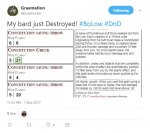Lanefan
Victoria Rules
I am not the sort of textbased adventure that would do that before marriage.
>Marry Textbased Adventure
I am not the sort of textbased adventure that would do that before marriage.
>Marry Textbased Adventure
>Marry Textbased Adventure
Now this is something that annoys me: DMs red-flagging what's important via how they describe things. It's just another form of lead-'em-by-the-nose, really.
The relative importance (if any) of moving the table isn't known to the characters when they enter the room, and it's up to them to figure it out. The presence of the table at all might be a 'tell' if surrounding rooms have been completely empty, for example; and if they think to move it and search the floor revealed they might find a secret door leading down to a whole new level. But if they don't think to move it they'll miss that level - so be it.
Sure. But what if they don't search the table? What if they only search the walls for secret doors and then give up and move on? What if they don't search anything in this room?Sure, and that's the sort of thing that when a player "Searches the table." notices some worn scuff-marks on the floor on one side of the table.
It's fine for players to miss things, but I find pixel-whining in either direction a waste of everyone's time. If I rolled a search of the table and then 2 sessions later we're all wonderning what we missed and the DM explained the table moved and I on't didn't notice it because I didn't say "I search the floor immediately around the table for any signs of scuff marks indicating the table moves." I'd tell him where he can put his magic words.
Are you sure you want to? I won't do that after marriage, either.
Charlaquin said:I don’t see a “Textbased” here
>Attack Bear
The only thing I-as-DM would have done differently here is the line where I inserted '***' would instead read: DM: OK, you try to pick up the table and immediately realize it's way too heavy. It is made of stone, after all. All you manage is to budge it just enough to tell you it's not attached to the floor.
And in case it matters, had a die roll been attached to the declaration, as in "I pick up the table <roll> Athletics check adds to 21" my response as DM would have been the same.
Disagree. The room was described just fine - nothing in it except a worn stone table in the middle. The player states an action "I pick up the table" without any further ado, the result of which is that the character determines the table is too heavy to lift.
Had the stated action been "I check out the table" then that would have been a reasonable place to give info about its probable weight, along with how dusty it is and any other pertinent info. But the player-in-character jumped straight to "I pick up the table" leaving the DM no option but to respond to that declaration.
Yeah, I'm not sure why [MENTION=6777696]redrick[/MENTION] would say that was a mistake. I sure don't think it was.
Lanefan
DM: You enter a small room. A worn stone table stands in the center of the room.
PLAYER: I pick up the table.
DM: It looks like it weighs a ton.
PLAYER: Oh, never mind.
PLAYER: Oh, ok. Guys, maybe we can all push this table together and get it to move across the room?
PLAYERS: Sounds like a great plan.
DM: Only three of you can get around the table.
DM: Great. You three, give me a group Athletics check.
Haha, man, I have never had the opportunity to spend this much time considering the adjudication of a player action before! It's quite an exercise. I should record my sessions and invite all y'all to mark up my DM-voice in red pen.

